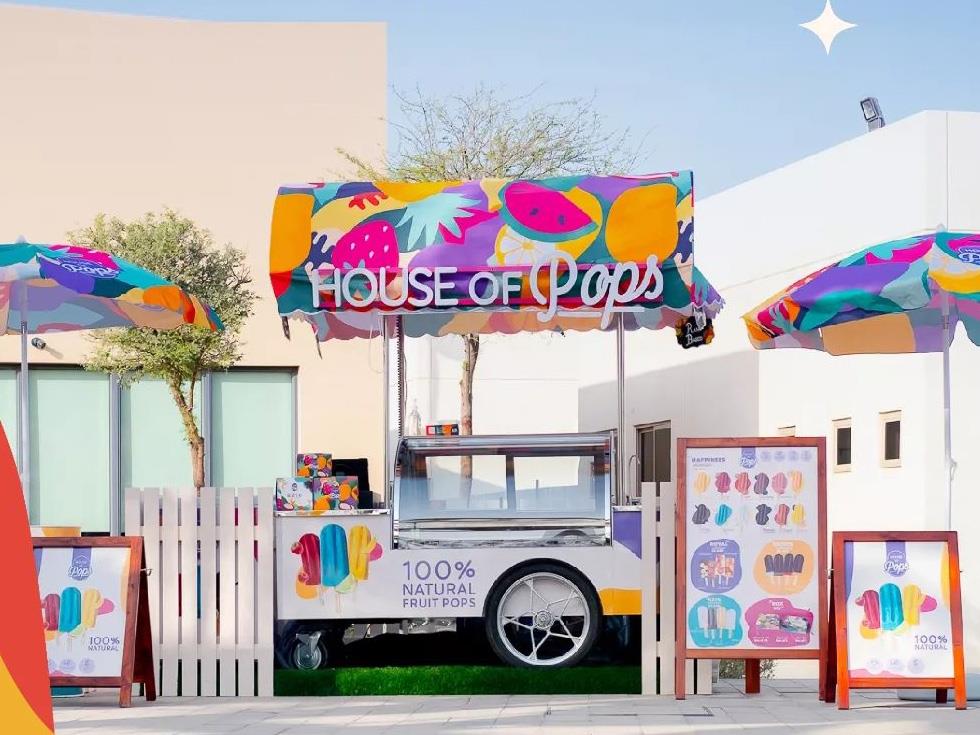(MENAFN- The Peninsula) Bloomberg
In Dubai, there are traps set for parents across town - in malls, at beaches and five-star resorts - in the form of popsicle stands. Once children see the brightly colored awning with the House of Pops logo and the pink, blue and chocolate popsicles, there's no going back. You've got to buy one, and it will cost you 20 dirhams ($5.45).
"Sorry for that,” laughs Mazen Kanaan, co-founder of the Dubai-based ice cream company. "But it's on purpose.”
Kanaan, the former head of Unilever's ice cream business in the Middle East and North Africa, and his now-wife, Marcela Sancho, started the company in September 2018. Since then they've taken the United Arab Emirates by storm; They're available in 100 hotels, cafes and restaurants, grocery stores including the Carrefour chain and 24 of their own retail locations, as well as on the country's delivery apps. The most popular flavors of their eye-catching, vegan popsicles flavors include standards mango, coconut, strawberry and chocolate, but their most recognizable slices are the Instagram-friendly mango studded with strawberry slices and the bright blue Galactic Lime, which gets its color from blue spirulina. Among the more unusual of their 28 regular flavors are the dragon-fruit-filled dragon colada; chocolate-dipped passion fruit; and black lemonade made with charcoal.
They're all made in a factory in Jebel Ali, an industrial area of southern Dubai, where they tinker with flavors - some that work, and some that don't, like the pineapple basil. Customers loved seeing that one in display cases but stuck with their favorites, Sancho says.
The growth of House of Pops has been swift: In its first full year, the company sold 55,000 popsicles. Three years later, that had increased tenfold. And in the past 12 months through April, they've sold 1.3 million popsicles. The company's bicycles and carts are called out to more than 250 events a year, from corporate catering to birthday parties - they can print the birthday kid's name on the packaging - or even royal events.
And House of Pops is about to become even more visible. Kanaan and Sancho's franchise partner in Saudi Arabia has a plan to open 80 franchises across the kingdom in the next six years, in addition to the four that opened in the past year. The first franchise store in Bahrain opens next week. They've just signed a licensing agreement with Disney to produce limited edition Mickey and Minnie Mouse-branded pops. Later this year, House of Pops ice cream and sorbet pints will launch in grocery stores alongside their popsicles, as well as bites-cubes of chocolate, strawberry or coconut dipped in 72% single origin Madagascar chocolate. Starting this summer, the treats will also be available on some Emirates Airline flights.
Two of House of Pops' selling points are particularly attractive to parents-and companies. It promotes its sustainability choices, such as biodegradable packaging and a propane fuel used in most of their freezers that has less impact on global warming.
With no refined sugar, additives or flavorings, the pops are a healthier, plant-based alternative to many other dessert options. They have a keto line for those looking to go low-carb. The lack of allergens such as milk or nuts helped the company win a partnership with the Dubai Municipality to distribute pops in schools as part of a healthy eating campaign. (However, the lack of nuts is limiting, says Sancho. Vanilla ice cream made with cashew nuts would taste better than a product made with coconut milk.)
The sustainable choices can also mean higher expenses: agave instead of sugar and compostable packaging, Kanaan says, is four times more expensive. Customers aren't turned off by the price of the popsicle-20 dirhams for regular ones and 25 dirhams for specialty pops-especially when they know the quality they're getting for their money, he says. In the grocery store, people pay 18.80 dirhams for one of their mighty mango pops compared with 8 dirhams for a Baskin Robbins mango sorbet or 2.40 dirhams for a Wall's Max Twister ice cream pop. Kanaan says it's like buying a latte. "If you deliver a good product and good branding-it should look cool as well-people will buy it,” he says.
Not all of their flavors have been big hits. Sancho, who is from Costa Rica, says she expected selections like orange, banana and pineapple to do well, but they don't sell.
At the end of the day, it's a fun business to be in. "I think it energizes everyone,” says Kanaan. "It feels really great, and I always have this in mind that you would never see someone crying and eating an ice cream. Like, never.




















Comments
No comment